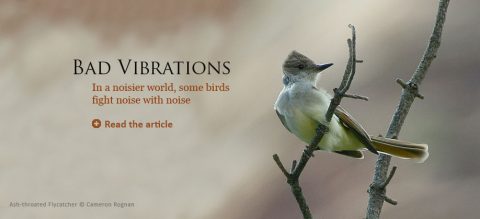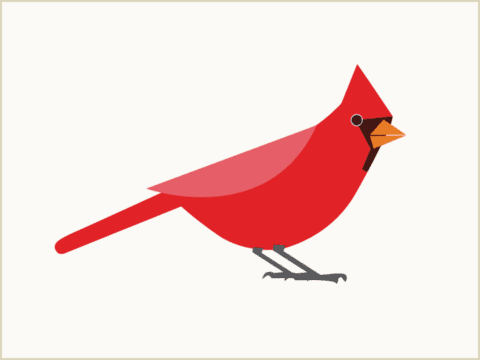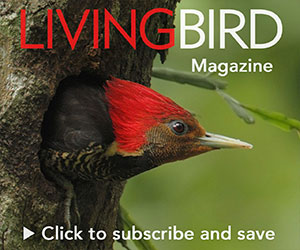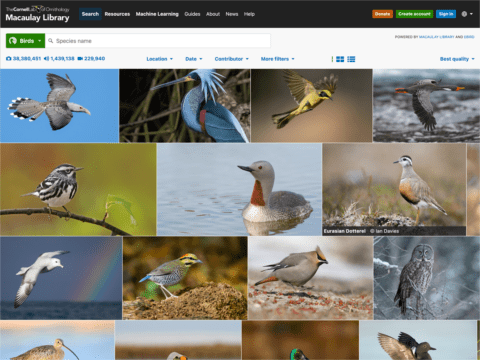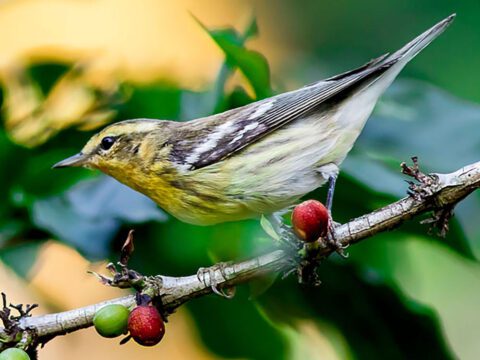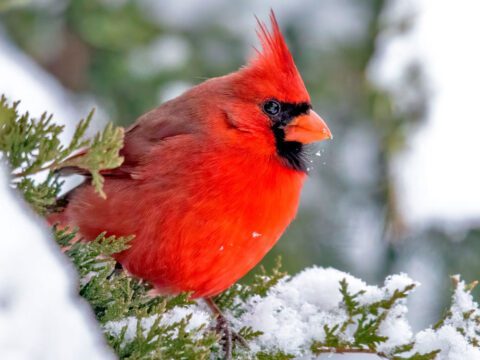Thieves With Benefits: The Not-So-Bad Habits of Fork-tailed Drongos
By Caitlin Stern; Photographs by Andrew Radford
July 15, 2011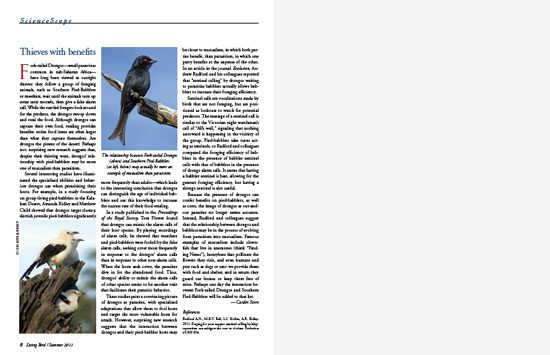
Fork-tailed Drongos—small passerines common in sub-Saharan Africa—have long been viewed as outright thieves: they follow a group of foraging animals, such as Southern Pied-Babblers or meerkats, wait until the animals turn up some tasty morsels, then give a false alarm call. While the startled foragers look around for the predator, the drongos swoop down and steal the food. Although drongos can capture their own food, stealing provides benefits: stolen food items are often larger than what they capture themselves. Are drongos the pirates of the desert? Perhaps not: surprising new research suggests that, despite their thieving ways, drongos’ relationship with pied-babblers may be more one of mutualism than parasitism.
Several interesting studies have illuminated the specialized abilities and behaviors drongos use when parasitizing their hosts. For example, in a study focusing on group-living pied-babblers in the Kalahari Desert, Amanda Ridley and Matthew Child showed that drongos target clumsy, skittish juvenile pied-babblers significantly more frequently than adults—which leads to the interesting conclusion that drongos can distinguish the age of individual babblers and use this knowledge to increase the success rate of their food-stealing.
In a study published in the Proceedings of the Royal Society, Tom Flower found that drongos can mimic the alarm calls of their host species. By playing recordings of alarm calls, he showed that meerkats and pied-babblers were fooled by the false alarm calls, seeking cover more frequently in response to the drongos’ alarm calls than in response to other non-alarm calls. When the hosts seek cover, the parasites dive in for the abandoned food. Thus, drongos’ ability to mimic the alarm calls of other species seems to be another trait that facilitates their parasitic behavior.
These studies paint a convincing picture of drongos as parasites, with specialized adaptations that allow them to fool hosts and target the most vulnerable hosts for attack. However, surprising new research suggests that the interaction between drongos and their pied-babbler hosts may be closer to mutualism, in which both parties benefit, than parasitism, in which one party benefits at the expense of the other. In an article in the journal Evolution, Andrew Radford and his colleagues reported that “sentinel calling” by drongos waiting to parasitize babblers actually allows babblers to increase their foraging efficiency.
Sentinel calls are vocalizations made by birds that are not foraging, but are positioned as lookouts to watch for potential predators. The message of a sentinel call is similar to the Victorian night watchman’s call of “All’s well,” signaling that nothing untoward is happening in the vicinity of the group. Pied-babblers take turns acting as sentinels, so Radford and colleagues compared the foraging efficiency of babblers in the presence of babbler sentinel calls with that of babblers in the presence of drongo alarm calls. It seems that having a babbler sentinel is best, allowing for the greatest foraging efficiency, but having a drongo sentinel is also useful.
Because the presence of drongos can confer benefits on pied-babblers, as well as costs, the image of drongos as out-and-out parasites no longer seems accurate. Instead, Radford and colleagues suggest that the relationship between drongos and babblers may be in the process of evolving from parasitism into mutualism. Famous examples of mutualism include clownfish that live in anemones (think “Finding Nemo”), honeybees that pollinate the flowers they visit, and even humans and pets such as dogs or cats: we provide them with food and shelter, and in return they guard our homes or keep them free of mice. Perhaps one day the interaction between Fork-tailed Drongos and Southern Pied-Babblers will be added to that list.
References
Radford A.N., M.B.V. Bell, L.I. Hollén, A.R. Ridley. 2011. Singing for your supper: sentinel calling by kleptoparasites can mitigate the cost to victims. Evolution 65:900-906.
All About Birds
is a free resource
Available for everyone,
funded by donors like you
American Kestrel by Blair Dudeck / Macaulay Library
